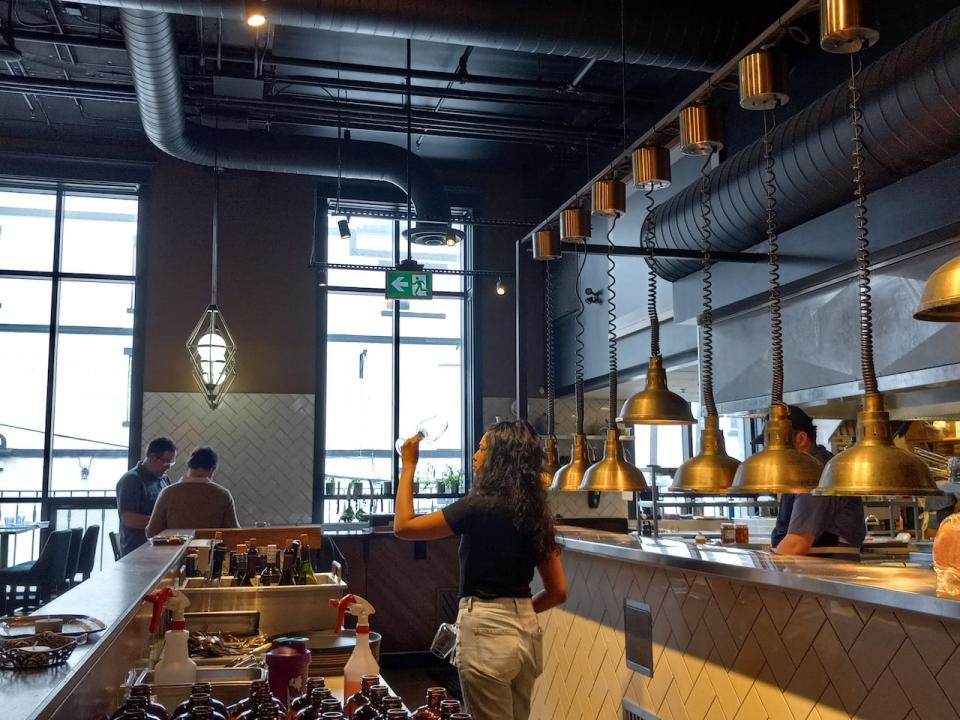Mallard Cottage bankruptcy casts cloud over restaurant industry as profitable summer season looms


Ahead of the busy summer season, Mallard Cottage has been closed for months and it's uncertain if it will reopen. (Elizabeth Whitten/CBC)
As Canada's national development bank is aiming to force Newfoundland and Labrador's flagship restaurant Mallard Cottage into bankruptcy, other restaurants in St. John's are hoping the loss won't cast a shadow over the most profitable time of year.
The iconic Mallard Cottage, nestled on Quidi Vidi harbour in St. John's, remains closed — and it might stay that way, to the chagrin of food industry counterparts around town.
Earlier this month, the Business Development Bank of Canada (BDC) filed an application with the Supreme Court of Newfoundland and Labrador to force Mallard Cottage Inc. into bankruptcy and place it under a trustee.
In documents, the BDC alleges the company — which lists Blair McIntosh as its sole director — owes more than $500,000.
The upheaval leads one restaurant expert to fear Mallard Cottage's troubles will leave a gaping hole in the local dining scene.
Jordi Morgan, a vice-president with Restaurants Canada, said dining at Mallard Cottage is a key part of tourism itineraries. But if it doesn't open up this summer, people will go elsewhere, he says.
"Because it holds such an iconic position in the culinary pantheon, if you will, of Newfoundland and Labrador, I think that it's something that people pay attention to," said Morgan.
But new restaurants are also opening, he points out, adding restaurateurs are a "resilient bunch" and now have the opportunity to position themselves as a main player in the scene.
"I think that really the reputation that Newfoundland and Labrador has built as a food destination will remain, but it won't go unnoticed if Mallard Cottage is not on the menu this summer," said Morgan.
Chinched co-owner Michelle LeBlanc said the news about Mallard Cottage came as a shock, adding she's always been a fan of the restaurant, which bought products from Chinched.
"It had international recognition. They've always done amazing things. It's a great space. It's in the historic village," said LeBlanc.
"It plays a role in, I think, how people see the dining scene both locally and internationally."

Chinched co-owner Michelle LeBlanc says she’d like to see people rally around restaurants and support them in ways they can. (Elizabeth Whitten/CBC)
Jeremy Bonia, Merchant Tavern co-owner and sommelier, also worried about what its closure could mean, and said its loss would be felt in the local dining scene.
"We've sort of, over the years, become a culinary destination in Canada. I think we're known for that. And to lose a great restaurant like that and a great brand like that, it's going to be tough. It's going to be tough for everybody," said Bonia.
The 8 Barrow's Road property was sold on Jan. 3 to a numbered company — which the BDC said lists its director as McIntosh — for $712,500, the BDC claims in documents.
The BDC said it wasn't informed of the sale and didn't get money from the proceeds, and included a list of recipients like TD Bank ($63,652.53), McIntosh ($23,961.21), Muskox Buffett PLC Inc. ($146,943.67), and the CRA ($95,136.58), among others.
The BDC alleges that the debtor "acted in bad faith" and violated the Fraudulent Conveyances Act.
McIntosh did not respond to requests for comment.
A hearing for the application requesting bankruptcy is set for April 24.
Tourism season swiftly approaching
There are weeks to go before the weather improves, and under the current economic forecast, restaurateurs are eagerly anticipating the extra income.
Bonia said many businesses financially depend on a strong summer season.
"It's our busiest time of year. It's the time when you make your money, and a lot of people will open just for the summer months," Bonia told CBC News.
LeBlanc agreed, adding that in the summer every day of the week will be busier, not just the weekends.
WATCH | Success is relative, explains this sommelier:
She said a good summer, financially speaking, can get a business through until Christmas, and then holidays like Valentine's Day and other events help them through the leaner months until things pick up around May.
LeBlanc said Chinched will bring on new hires and get them trained to prepare for the influx.
"There's the challenges with finding the right staff and getting the vibe. And we've always been super fortunate that our staff have always vibed really well together," said LeBlanc.
Bonia said getting ready ahead of the summer is something learned over time, and includes expanding business hours and hiring additional staff, which coincides with the school semester ending.
Predicting the future
Morgan points out that increased outdoor activity and patio season mean summer is key for the restaurant industry in Atlantic Canada.
He said there are a few positive trends that could mean good things for restaurants, like the increase in tourism. But inflation has cut into people's spending, which can affect decisions to dine out.
"I think during this summer there is some reason to be optimistic about people getting out and spending a little bit more money," said Morgan. "That all being said ... there's a lot of pressures on restaurants now from the cost side."
There are some indicators as to whether a season will be busy, said Bonia, which includes looking at scheduled conventions and advance restaurant bookings.

Summer months are the busiest time of year for restaurants and can financially carry them through leaner times. (Elizabeth Whitten/CBC)
He said last year was great for business, but this year inflation is a bigger concern.
"We're really hoping for a busy summer. We want lots of people to come out and enjoy St. John's and the rest of the province. And hopefully we can all make a go of it," said Bonia.
LeBlanc is also optimistic about international travellers coming back because of WestJet's direct London route, which begins in May.
Download our free CBC News app to sign up for push alerts for CBC Newfoundland and Labrador. Click here to visit our landing page.

